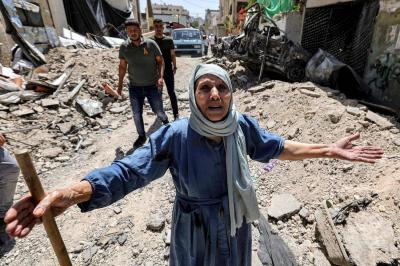The global demands for a "humanitarian ceasefire" in the war between Israel and Hamas continue to be ignored, leading to a near-total blockade of Gaza, except for very limited supplies of humanitarian aid. The situation has worsened with severe shortages of food, fuel, drinking water, and medicine. Below is an overview of what some UN organizations have described as a "humanitarian disaster" unfolding in the territory inhabited by 2.3 million people and controlled by Hamas.
*Displacement*
The United Nations Office for the Coordination of Humanitarian Affairs reported that approximately 1.4 million people, more than half of Gaza's population, have fled their homes, with nearly 700,000 sheltering in buildings run by the United Nations Relief and Works Agency for Palestine Refugees (UNRWA). Israel has advised civilians in the northern Gaza Strip to move south for their safety; however, the south has also faced Israeli airstrikes, resulting in casualties among non-combatants. The office states that shelters are filled to nearly four times their capacity, and tens of thousands of Gaza residents are seeking refuge in hospitals.
*Hospitals*
The World Health Organization indicates that more than a third of Gaza's 35 hospitals are out of service, and those still operating are reporting acute fuel shortages, severely limiting their electricity supply. The organization noted that the Turkish-Palestinian Friendship Hospital in Gaza City, the only facility treating cancer patients, has run out of fuel and ceased operations. Palestinian civil defense rescue teams have had to reduce their ambulance fleets due to fuel shortages, resorting to using towing vehicles to transport the dead and injured to hospitals.
*Aid Delivery*
The Office for the Coordination of Humanitarian Affairs reported that at least ten trucks carrying water, food, and medicine entered Gaza through the Rafah crossing with Egypt the day before yesterday, increasing the total number of trucks that have entered since the limited reopening of the crossing on October 21 to 227. However, they stated that the delivery of aid from the south to the displaced in the north has stopped following the Israeli ground invasion.
*Water*
The Office for the Coordination of Humanitarian Affairs indicated that one out of three water supply lines from Israel to Gaza has been reopened for the first time since October 8. Two seawater desalination plants are operating at 40% of their capacity. There are also some wells, allowing some families to access water for a few hours daily, in addition to limited amounts transported by truck.
*Fuel*
Relief groups report a desperate need to distribute aid and run electricity in hospitals, bakeries, and desalination plants. However, Israel continues to prohibit the entry of fuel, claiming it could fall into the hands of Hamas for military purposes.




